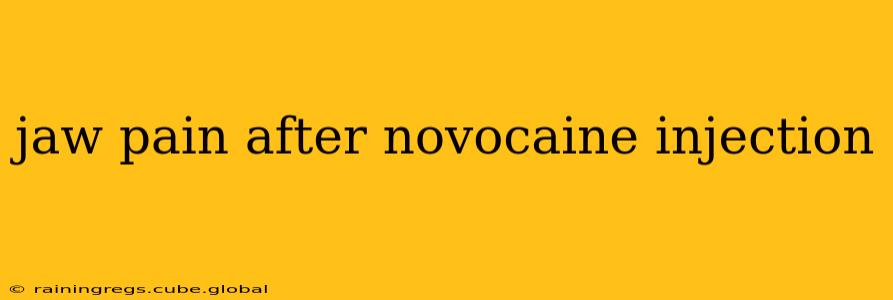Experiencing jaw pain after a Novocaine injection is a relatively common occurrence, often causing concern and discomfort. While usually temporary, understanding the potential causes, how long it lasts, and effective relief methods is crucial for managing this post-injection discomfort. This comprehensive guide will address your concerns and provide valuable insights into this issue.
What Causes Jaw Pain After a Novocaine Injection?
Several factors can contribute to jaw pain following a Novocaine (or other local anesthetic like lidocaine) injection. The most common causes include:
-
Injection Site Trauma: The injection itself can cause minor trauma to the tissues in your jaw. This trauma can lead to inflammation and subsequent pain. The needle puncture, pressure from the injection, and the anesthetic solution itself can all contribute to this.
-
Muscle Soreness: Depending on the location and type of procedure, the muscles in your jaw might be stressed or strained during the injection. This can result in soreness and stiffness that manifests as jaw pain.
-
Nerve Irritation: While rare, the injection might inadvertently irritate a nearby nerve. This can cause more intense and lingering pain than simple injection site trauma.
-
Infection: Although uncommon with proper sterilization techniques, an infection at the injection site is a possibility. This would typically present with increasing pain, redness, swelling, and potentially pus.
-
Underlying Conditions: Pre-existing conditions affecting your jaw, such as temporomandibular joint (TMJ) disorder, might exacerbate the pain following the injection.
How Long Does Jaw Pain After Novocaine Last?
The duration of jaw pain following a Novocaine injection varies greatly, depending on the factors mentioned above. Generally, you can expect the pain to subside within a few hours to a few days. However, if the pain persists for longer than a week, or if it worsens, it's crucial to seek medical attention.
What to Do if You Have Jaw Pain After a Novocaine Injection
Most jaw pain after a Novocaine injection is mild and resolves on its own. However, several self-care measures can help manage the discomfort:
-
Ice Packs: Applying ice packs to the affected area for 15-20 minutes at a time can help reduce swelling and inflammation.
-
Over-the-Counter Pain Relievers: Nonsteroidal anti-inflammatory drugs (NSAIDs) like ibuprofen or naproxen can help alleviate pain and inflammation. Always follow the recommended dosage instructions.
-
Gentle Massage: Gently massaging the area around the injection site can help ease muscle tension and soreness.
-
Rest: Avoid strenuous activities that might exacerbate the jaw pain.
Is Jaw Pain After a Novocaine Injection Serious?
In most cases, jaw pain following a Novocaine injection is not serious and resolves on its own. However, seek immediate medical attention if you experience:
- Severe or persistent pain that lasts longer than a week.
- Increasing swelling or redness at the injection site.
- Signs of infection, such as pus or fever.
- Difficulty opening or closing your mouth.
- Numbness or tingling that spreads beyond the injection site.
Can I Prevent Jaw Pain After Novocaine?
While you cannot entirely prevent the possibility of jaw pain, following these tips may reduce your risk:
- Inform your dentist of any pre-existing jaw conditions.
- Follow your dentist's post-injection instructions carefully.
- Avoid excessive chewing or jaw movements in the hours following the injection.
Why does my jaw still hurt after the Novocaine wore off?
The lingering pain after the Novocaine wears off is likely due to the initial trauma of the injection itself, inflammation, or the irritation of underlying conditions like TMJ. The anesthetic numbs the area, masking the pain initially, but the underlying cause remains.
How long should my jaw be numb after a Novocaine injection?
The duration of numbness varies depending on the amount of anesthetic used, the injection site, and individual factors. Numbness typically lasts for several hours, but it can sometimes linger for a few more. If numbness persists excessively, consult your dentist.
This information is for general knowledge and does not constitute medical advice. Always consult a healthcare professional for diagnosis and treatment of any medical condition.
